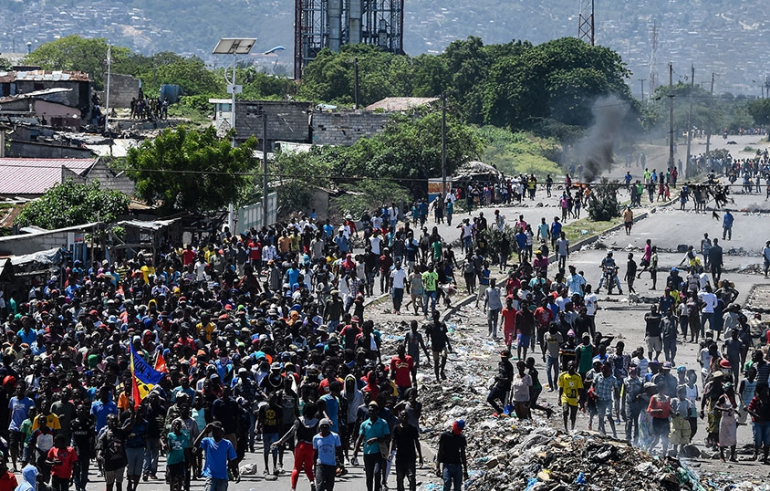
When last September, the Haitian government announced further increases in gas prices could not have expected how fast the country would fall into a comma. Thousands of Haitians took to the streets of Port-Au Prince to protest against the inflation, while a federation of gangs is blockading for more than a month now the country’s principal fuel terminal. This new governmental decision came at a time when the country is facing serious challenges like famine, extreme poverty, unemployment, and widespread violence.
As with every other tension, this is political based as well. Many Haitians do not recognize Ariel Henry as the Prime Minister, as he was appointed the country’s new leader by the President just days before he was assassinated. Although elections were a strong demand by many Haitians, after the murder of the President, the new Prime Minister was installed immediately. During the latest tension, the protestors are asking for the ousting of Henry.
The blockade of Haiti’s main fuel port has caused a domino of problems. The lack of gas and diesel led to the stop of transportation and forced hospitals and businesses to close. It is almost impossible for thousands of Haitians to find clean water and food, in addition to the food insecurity they had already been facing when the country just announced the outbreak of the cholera epidemic. Violence is raging, with gangs ruling effectively in many areas of the country. Although gangs have a long presence in the country, under the current climate of political instability, they are acting with no fear of punishment. And while the country is paralyzed, the black-market flourishes. A single gallon can reach $30 on the black market in Port-au-Prince and more than $40 in rural areas. Many have attempted to leave Haiti and survive the multidimensional crisis that the country is facing, with more than 100 Haitian migrants found on an island near Puerto Rico, two days ago. The locals say that the people would not survive more than a week or two in the situation now in Haiti.
The Haitian Foreign Minister issued a distress call to the Security Council for the humanitarian crisis and the Prime Minister, Ariel Henry, appealed for the intervention of “specialized armed force” from abroad. It is unclear to whom this request for international assistance is referring or what form of intervention the government is expecting, while the UN is stating that they have not received any official request from Haiti’s government. Both the US and Mexico have announced the preparation of a UN Resolution that would authorize “an international assistance mission” with the aim to enhance the country’s security.
During an emergency meeting of the UN Security Council, the US Ambassador to the UN Linda Thomas-Greenfield proposed “a limited carefully-scoped non-UN mission led by a partner country with the deep, necessary experience”. The partner country, which was not named, would have the authority to use military force if necessary. Additionally, the US and Mexico proposed a second resolution that would impose targets on gang members. During the meeting, the Russian and Chinese envoys to the UN expressed concerns about the reaction of the Haitian people to a foreign force.
However, after a very controversial 11 years-long UN stabilization Mission to Haiti, which ended in 2017, many have heavily criticized a new international intervention, with the Haitians being strongly against it. UN, after the fall of President Jean-Bertrand Aristide in 2004, a time when Haiti was dealing with a severe political, economic and humanitarian crisis, sent military personnel to improve the country’s security. But the international peacekeeping mission in Haiti was a disaster. Several scandals involving UN peacekeepers came into the spotlight with accusations related to the spark of the Cholera epidemic in 2010 and sexual abuses and exploitation of women and children by UN peacekeepers. As the US ambassador stated the United States is “keenly aware of the history of international intervention in Haiti, and specifically of concerns about the council authorizing a response that could lead to an open-ended peacekeeping role.”
By The European Institute for International Law and International Relations.















